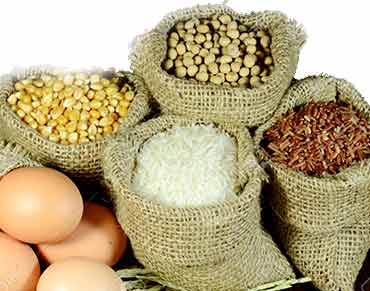Synopsis
High blood
cholesterol is an asymptomatic condition that
is often associated with an increased risk for coronary heart disease.
In our body, there are two distinct types of proteins that bind and transport
cholesterol, and, for this reason,
cholesterol is divided into two different
types: HDL (high-density lipoprotein) and LDL (low-density lipoprotein). HDL is
considered the “good” cholesterol form as
it removes cholesterol deposits from the arteries, while LDL is the “bad” one,
as it contributes to atherosclerotic deposits that increase the risk of
cardiovascular diseases1.
Therapies
Lifestyle
changes and nutritional approaches are the first and foremost therapeutic step required to reduce high
cholesterol levels. However, the nutritional levels of some foods like eggs,
soybean and corn may have a peculiar profile that could make unclear whether introducing
them in a diet could be good or bad for a patient suffering from hypercholesterolemia.
Science
Although eggs
are extremely rich sources of cholesterol,
they do not represent a dangerous food for patients with high blood
cholesterol. Cholesterol introduced through dietary sources has, in fact, minimal
effects on its plasmatic levels. Regular egg consumption may even have a
beneficial effect on cardiovascular health, provided that the patient is not
diabetic2. Soybeans have often been associated with an alleged
reduction of the LDL levels, however ampler researches did not confirm this
claim. However, soy-based foods are a
better alternative to red meat, as they contain lesser quantities of the much
dangerous saturated fats3. Corn instead is just cereal, so it is a fat-free food. However, many junk foods prepared with corn may
be unhealthy, as they contain high quantities of low-quality oils as additives,
like popcorn, commercial cornbread stuffing mix,
and corn muffins.
REFERENCE LINKS:
1.Information, National Center for
Biotechnology; Pike, U. S. National Library of Medicine 8600 Rockville; MD,
Bethesda; USA, 20894 (2014-06-11).
“High Blood Cholesterol.”
PubMed Health.
2.Rong y, et al. Egg consumption and
risk of coronary heart disease and stroke: Dose-response meta-analysis of
prospective cohort studies. British Medical Journal. 2013;346:e8539
3.Messina M. Insights
gained from 20 years of soy research. Journal of Nutrition. 2010;140:2289S.
See: Baking soda for heartburn & acid reflux
Authors:
Dr.
Claudio Butticè, PharmD.







